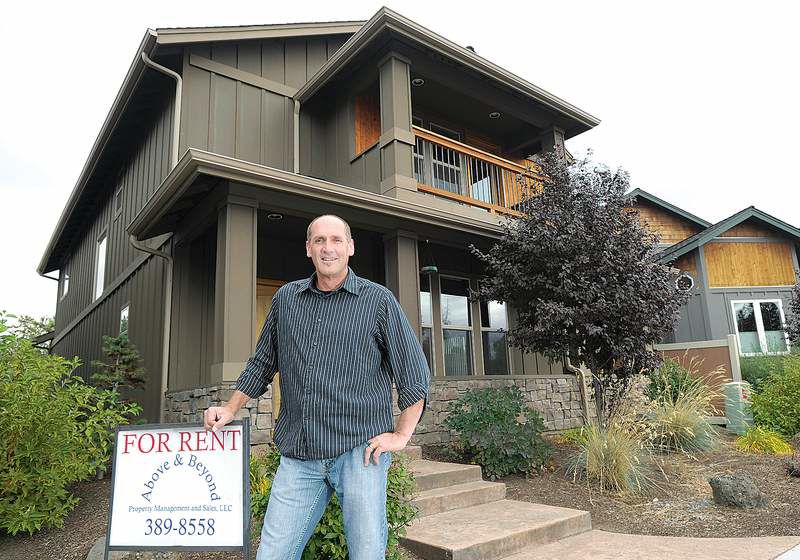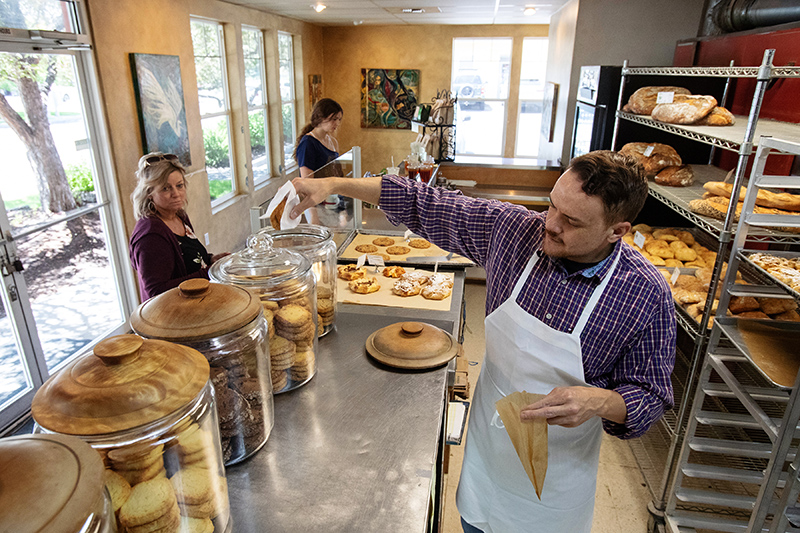Rental market continues stabilizing
Published 5:00 am Friday, September 17, 2010

- Tim Reynolds, owner of Above and Beyond Property Management of Bend, says there are a lot of good-quality rentals available at bargain prices. “I am optimistic about the rental market. There are a lot of people losing their homes who are going into the rental market, and investors are buying up those properties,” Reynolds said.
Bend’s rental housing market continues to stabilize due in part to the misfortunes of people who lost their homes and are transitioning from homeowners to renters.
“In single-family residential rentals, from the summer of 2009 to the summer of 2010, we have actually seen a decrease in vacancies and an increase in rental rates,” said Lawnae Hunter, president of the Central Oregon Rental Owners Association.
“People moving out of homes due to short sales or foreclosures are going into single-family rentals, because that is what they are used to,” Hunter said.
Kevin Restine, general manager with Plus Property Management, also sees people who lost their homes due to the mortgage crisis and economic decline moving into rental houses, which he said is turning out to be “the silver lining in an otherwise dark cloud” for property owners.
“We see lots of folks, who have lost their homes due to different scenarios, who have long histories of paying their bills well. They have turned out to be very good tenants,” Restine said.
Hunter said the mortgage crisis and recession have taken a toll on home ownership nationwide. The latest U.S. figures show ownership declined from 59 percent to 55 percent over the past two years, she said.
In addition to reducing vacancy rates in single-family rentals, Restine and Hunter said the migration of former homeowners into rental housing also has helped stabilize vacancy rates for upper-end duplexes and three-bedroom apartments.
Vacancy rates still remain fairly high, however, for two-bedroom apartments, especially in complexes Hunter described as being “in the low end of the rental market.
“Rentals in the $650-and-below market are more sensitive to job losses,” Hunter said, adding that wage earners in that population are more vulnerable to economic troughs and related unemployment, or reductions in wages or hours.
Even in the older, lower-end apartment complexes, Hunter said vacancy rates aren’t as bad as they were a year ago.
“Last summer, some of the larger complexes had vacancies of up to 25 percent,” Hunter said. “I think that number has come down.”
Becky Ozrelic, a past president and current board member of COROA, said the association’s last vacancy rate survey, done in the first quarter of 2009, showed an overall vacancy rate for rental homes and apartments of 12 percent, which she said was nearly double the vacancy rates that hovered around 6 to 7 percent in 2007 and 2008. Those rates represented a huge increase from a 3.4 percent vacancy rate reported in the group’s 2001 survey.
For the first time in 20 years, Ozrelic said, COROA didn’t include vacancy rates in its 2010 survey, so the association doesn’t have current data for comparison.
Rents holding steady
Based on reports Ozrelic has heard from fellow COROA members, she said rents have held steady for single-family homes, and apartment rents continued to rebound this summer after dropping the last two years.
For single-family homes, Ozrelic said people who couldn’t make $2,000 monthly mortgage payments on homes they lost can afford $969 a month in rent. That’s the average cost for a three-bedroom house in the Bend area reported in the first quarter of 2010, down from $1,003 during the same period in 2009.
Rents for a two-bedroom house averaged $803, down from $826 in 2009; and the average rent for a one-bedroom house reported in the association’s 2010 survey was $612, down from $616 in 2009.
The association’s surveys show rents for single-family homes haven’t varied more than $30 or $40 in several years, going back to 2006, when the region’s housing market was still booming, and the vacancy rate was low, Ozrelic said.
“We have extremely affordable rents compared to other places,” Ozrelic said. “You can’t rent a place in Portland anywhere near what you can rent a place for here.”
Market optimism
Tim Reynolds, a builder turned property manager, said he bought Above and Beyond Property Management of Bend about a month ago because he believes property values in Bend and Central Oregon will rebound.
“I am optimistic about the rental market. There are a lot of people losing their homes who are going into the rental market, and investors are buying up those properties,” Reynolds said. “It gives you good-quality rentals at bargain prices.”
As investors buy up foreclosed homes, Reynolds said that adds to the inventory of rentals for property-management companies.
Tiffany Lahey, manager of Deschutes Property Management in Bend, said vacancy rates improved dramatically and rents stabilized over the summer for the single-family houses, duplexes and fourplexes in which her company specializes.
Property owners dropped rents $100 to $200 a month in 2009 due to higher than normal vacancy rates. During the past year or two, move-in specials went from $100 off the first month’s rent to a free month’s rent for a one-year lease. However, Lahey said the reduced rents and specials probably won’t last much longer since the company’s vacancy rate rebounded to an all-time low at the end of August.
“Recently, we have had so many people moving out of home ownership into rentals that our vacancy rate at the end of August was 3.9 percent,” Lahey said. “Our average (vacancy rate) is around 6 percent, so that is a big change.”
Lahey credits the improvement in vacancy rates, in part, to an easing of criteria for credit scores and other financial information by property owners.
“There’s more flexibility about employment history and credit scores because so many people came out of foreclosures, bankruptcies and job loss,” Lahey said. “All three of those have really affected people’s credit scores.”
She said renters who left big mortgages they couldn’t afford can start rebuilding their credit by paying monthly rent that is often half what they paid on their mortgage.
More garage rentals
Lahey and other property managers said they’ve also noticed an increased demand for garage rentals with the new wave of former homeowners needing extra space to store stuff that fit in larger homes but doesn’t fit in their smaller rental houses or apartments.
When it comes to large apartment complexes, Gary O’Connell, owner of Quantum Residential, which manages 5,500 apartment units in Central Oregon, Portland, Vancouver and the Tri-Cities area of Washington, said the large, older apartment complexes in Central Oregon were hit harder than other areas.
“Central Oregon is definitely the toughest market we have property in,” O’Connell said. “It has definitely been the most difficult — no question.
“We were seeing a lot more roommates and families sharing apartments to save money. That increased demand for three-bedroom units, so those rents have held fairly steady,” O’Connell said.
However, vacancy rates soared for two-bedroom units as people who lost their jobs left town or moved in with family members, he said.
Rents at The Commons at Pilot Butte in northeast Bend, which is managed by Quantum Residential, went from around $790 for a two-bedroom, two-bath apartment a couple years ago when the vacancy rate was near zero, to $709 this summer. That is up from a low point of $665 last summer.
Over two years, O’Connell said vacancy rates topped 10 percent at the older complexes, and rents were dropped 10 to 15 percent as owners of apartment complexes competed for renters.
Contrary to the averages, O’Connell said some of the newer, upscale apartment complexes managed by Quantum Residential, like the Village at Southern Crossing in west Bend, sailed through the recession with little effect.
“It is a newer place in a nice part of town. It is the highest rent in town right now, but it’s upscale, similar to a condo,” O’Connell said.
He said the occupancy rate at the Village at Southern Crossing was around 98 percent throughout the recession.
O’Connell said upscale apartment complexes — with rents of $799 to $950 for a nicer two- or three-bedroom unit — are renting well because they represent a choice for people who still have good jobs and are willing to pay more for location and newer quality.
While the biggest competition for apartment renters coming out of the recession has been from an influx of single-family homes coming onto the rental market, O’Connell said the market appears to be leveling out.
“I would say right now we are seeing the rental market stabilize just a little bit,” he said.






